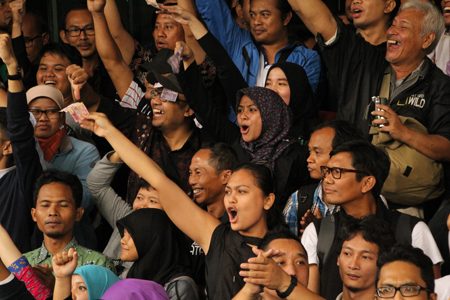Last Friday morning Bambang Widjojanto, Deputy Chief of Indonesia’s powerful Corruption Eradication Commission (KPK), was picked up by police while on his way to drop off his child at school. The police announced that Widjojanto was questioned for allegedly instructing a witness to give false testimony during a Constitutional Court hearing in 2010, in a matter related to a regional election. Widjojanto was working as a lawyer for one of the parties at the time.
Many believed that the digging up of an old case against Widjojanto was retaliation for the KPK’s investigation into President Joko Widodo’s top pick for the new National Police Chief Budi Gunawan. Widodo’s decision to nominate Budi, who was already known to have a suspiciously large bank account, angered many anti-graft activists.
Widodo came to power three months ago with a famously clean image. He promised to root out corruption. Days after Budi’s nomination was announced the KPK declared he was a suspect in a corruption case. Widodo responded by delaying Budi’s inauguration until investigations are complete.
According to Transparency International’s corruption perception index Indonesia ranked 107 out of 175 countries in the world.
The KPK have their own powers to investigate and charge suspects and in the past they have netted many high profile political and judicial cases. However despite being one of the most corrupt institutions in the country (according to Transparency International) the police have largely remained untouched.
Following Widjojanto’s arrest, activists used social media to organise a snap rally outside the KPK’s office to show their support and demand his immediate release. #SaveKPK was trending number one on Twitter throughout the day.
Activists and members of civil society gather on the steps of the Corruption Eradication Commission (KPK) office in central Jakarta to show their support for the organisation.
The KPK are widely perceived as Indonesia’s cleanest institution in a country where corruption is endemic in all levels of government and law enforcement.
A protester holds a sign reading ‘President where are you?’. Joko Widodo has disappointed many with his nomination of Budi Gunawan for National Police Chief and for his perceived inaction in defending the KPK.
Members of the Federation of Indonesia Metalworkers Union (FSPMI) protest in support of the KPK.
Protesters from the Federation of Indonesia Metalworkers Union (FSPMI) outside the KPK offices.
Protesters from the Federation of Indonesia Metalworkers Union (FSPMI) face off with National Police officers outside the KPK office.
Members of the National Police standing guard.
Water is distributed among the protesters.
Members of the National Police standing guard.
A small group of protesters arrive outside the KPK office protesting against the organisation. They burn a coffin carrying the image of KPK chief Abraham Samad.
A small group of ‘Anti-KPK’ protestors jump the fence and enter the complex attempting to confront the activists. Police hold back the group who shout threats and make violent gestures.
Activists wave money and taunt the ‘Anti-KPK’ protesters, insinuating they were paid to attend.
An activist holds a sign on the steps of the office.
Jarni Blakkarly is a Melbourne based journalist. His work has been published by Al Jazeera English, ABC Religion and Ethics, The Diplomat and Crikey among others. He is an editor at Asian Australian magazine Peril and has interned at Malaysiakini and Agency France Presse in Jakarta. You can follow him on Twitter @JarniBlakkarly
 Facebook
Facebook  Twitter
Twitter  Soundcloud
Soundcloud  Youtube
Youtube  Rss
Rss 












